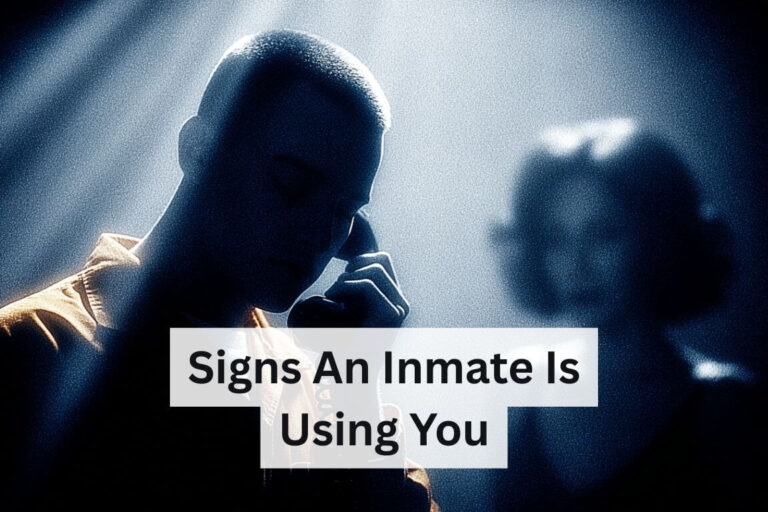Forming a connection with someone behind bars brings unique challenges that most relationships never face.
The physical separation, limited communication channels, and inherent power dynamics create a complex emotional landscape where genuine affection can sometimes become tangled with manipulation.
Understanding the difference between authentic connection and calculated exploitation becomes crucial when your heart is involved.
Recognizing these warning signs early can save you from emotional devastation and protect your financial stability while helping you make informed decisions about this deeply personal journey.
1. Money Talks Louder Than Love
When every conversation somehow circles back to your wallet, take notice.
The pattern usually starts subtly, a mention of commissary funds running low, followed by stories about how other inmates receive regular financial support from their loved ones outside.
Before long, these casual mentions transform into direct requests, then urgent pleas disguised as emergencies.
A partner who truly values you will express gratitude for any financial help you choose to provide, but they won’t make it the cornerstone of your relationship.
They’ll understand that your financial situation has limits and respect those boundaries without guilt-tripping or emotional manipulation.
Genuine relationships thrive on emotional intimacy, not financial transactions. If you find yourself feeling more like an ATM than a romantic partner, it’s time to step back and evaluate whether this connection serves both of your best interests.
Pay attention to timing, too. Do their financial requests coincide with your payday or bonus announcements?
This level of awareness about your financial situation, combined with strategic timing of requests, suggests calculated behavior rather than spontaneous need.

2. Surface-Level Sharing Only
Authentic relationships require vulnerability from both sides.
When someone consistently keeps their personal history, family relationships, and deeper emotions locked away, they’re maintaining emotional distance that prevents real intimacy from developing.
This guardedness often manifests as deflection when you ask meaningful questions about their past, their family, or what led to their current situation.
While everyone deserves privacy about certain aspects of their life, a pattern of evasiveness about basic personal information raises concerns.
Someone genuinely interested in building a lasting connection will gradually open up, sharing stories about their childhood, discussing their family relationships (both positive and difficult ones), and helping you understand the person they were before incarceration.
The absence of personal details keeps you from truly knowing them, which makes it easier for them to maintain whatever image serves their purposes best.
Real intimacy requires seeing someone’s flaws, understanding their struggles, and still choosing to care about them.
Without this deeper knowledge, you’re essentially in a relationship with a carefully crafted persona rather than a complete human being.
3. Emotional Vampirism
Supporting someone through difficult times is natural in any caring relationship. However, when you become the sole source of emotional stability for another person, the dynamic becomes unhealthy and unsustainable.
This pattern often develops gradually, you start as one of several people they confide in, but over time, you become their only emotional outlet.
The prison environment can be isolating, which makes it understandable that inmates might rely heavily on outside connections for emotional support.
Yet healthy individuals maintain multiple sources of support – family members, friends, counselors, or chaplains within the facility.
When someone places all their emotional weight on your shoulders while showing little interest in your own challenges and feelings, they’re treating you as a resource rather than a partner.
Notice whether your conversations feel balanced. Do they ask about your day, your stress, your victories and disappointments? Or do your calls and letters become therapy sessions where you provide comfort and advice while receiving little emotional reciprocity?
This imbalance not only drains your energy but also prevents the relationship from developing the mutual support that characterizes healthy partnerships.
4. Fast-Track to Forever
Declarations of love after minimal interaction should raise immediate red flags.
While intense connections can develop quickly, genuine deep affection typically requires time to build, especially in the constrained environment of prison communication.
When someone rushes toward serious emotional commitments, talking about marriage, eternal devotion, or life-changing plans together after just a few letters or phone calls.
They’re likely trying to secure your emotional investment before you have time to think clearly.
This rush often comes packaged with explanations about how the prison experience has taught them to appreciate real connections, or how meeting you has changed their entire perspective on life.
These declarations feel incredibly romantic and can be intoxicating to hear, but they also serve a practical purpose: emotionally committed partners are more likely to provide ongoing support and less likely to critically examine the relationship.
Take time to distinguish between genuine attraction and strategic emotional manipulation.
Real love develops as you learn about each other’s personalities, values, dreams, and compatibility.
It grows stronger as you navigate challenges together and see how each person handles stress, disappointment, and conflict.
When someone tries to bypass this natural development process, they’re usually more interested in the benefits of having a committed partner than in building an authentic relationship with you specifically.

5. Future Planning Feels Fuzzy
Conversations about life after release reveal a lot about someone’s true intentions. A person genuinely interested in building a future with you will naturally include you in their post-release plans.
They’ll discuss where they want to live, what kind of work they hope to find, and how they envision spending time together when physical proximity becomes possible.
Vague responses to questions about future plans often indicate that you don’t feature prominently in their long-term thinking.
They might speak generally about “getting out” and “starting fresh,” but when pressed for specifics about how you fit into these plans, their answers become evasive or overly general.
This vagueness isn’t necessarily malicious, but it does suggest that they view the relationship as serving their current needs rather than being part of their broader life goals.
Someone who sees a genuine future with you will be excited to discuss specific plans and will actively seek your input about decisions that would affect both of your lives.
Pay attention to whether they research opportunities in your area, express interest in meeting your family and friends, or ask about your own long-term goals and how their plans might align with yours.
The absence of these forward-thinking conversations suggests they’re focused on what the relationship provides them right now, not what it could become over time.
6. Conversation Monopoly
Healthy dialogue flows both ways, with each person sharing their thoughts and showing genuine interest in their partner’s experiences.
When your conversations consistently revolve around prison life, the food, the guards, other inmates, daily routines, and institutional politics, with little curiosity about your world, you’re experiencing a significant imbalance.
While their environment certainly influences their daily experience, someone who cares about you as a person will make effort to engage with your life outside those walls.
They’ll ask about your work, your hobbies, your family relationships, and your dreams. They’ll remember details from previous conversations and follow up on important events in your life.
This conversation monopoly often extends beyond just topic choice to emotional space as well.
Their problems, frustrations, and needs dominate your interactions, while your challenges receive minimal attention or are quickly redirected back to their situation.
This pattern leaves you feeling unheard and undervalued, like your role in the relationship is purely supportive rather than reciprocal.
7. Seasonal Affection Patterns
Watch for patterns in their attention and affection levels. Does their communication become more frequent and romantic as visits approach? Do they become especially charming before parole hearings or court dates?
These cyclical patterns suggest their engagement with you correlates more with their immediate needs than with consistent feelings.
Someone genuinely invested in your relationship maintains relatively steady communication patterns, adjusted for prison scheduling constraints and institutional limitations.
They don’t suddenly become more attentive when they need something and then return to minimal engagement afterward.
This seasonal affection often includes increased expressions of love, more frequent calls or letters, and greater interest in your life, but only during specific time periods when your support could be particularly valuable.
Between these periods, communication might become sparse, their responses less enthusiastic, and their interest in your life noticeably reduced.
8. Promise Everything, Deliver Nothing
Grand promises about future life together deserve healthy skepticism, especially when they involve expensive commitments or dramatic lifestyle changes.
Promises to buy you a house, take you on elaborate vacations, or completely transform their life upon release sound wonderful but often serve more to maintain your emotional investment than to reflect realistic planning.
Consider their actual circumstances when evaluating these promises. Most individuals leaving prison face significant challenges finding employment, securing housing, and rebuilding their financial stability.
While these challenges aren’t insurmountable, they do make elaborate promises unrealistic in the short term.
Focus more on smaller, achievable promises they make about communication, emotional support, and day-to-day relationship maintenance.
Someone who consistently follows through on small commitments is more likely to be trustworthy with larger ones.
Conversely, someone who regularly breaks minor promises while making grand gestures about the future is showing you their actual priorities.

9. Growth and Change Avoidance
Incarceration can be transformative when individuals engage with rehabilitation programs, therapy, educational opportunities, and personal reflection.
Someone genuinely interested in building a better life post-release will typically embrace these growth opportunities and want to discuss their progress and insights with you.
Resistance to discussing personal growth, rehabilitation efforts, or what they’re learning about themselves raises concerns about their commitment to positive change.
This avoidance might manifest as dismissing therapy as “useless,” expressing cynicism about educational programs, or showing no interest in addressing the issues that led to their incarceration.
While not everyone processes personal growth in the same way, someone planning a future with you should be able to discuss how they’re working to become a better partner, citizen, and person.
Their willingness to engage with difficult questions about their past choices and future goals indicates emotional maturity and genuine commitment to change.
10. Boundary Testing and Pushing
Healthy relationships respect individual boundaries and comfort levels.
When someone consistently pushes you to provide more money, visit more frequently, or take actions that make you uncomfortable, they’re prioritizing their wants over your well-being.
This boundary pushing often starts small and escalates over time as they test your limits.
Pay attention to how they respond when you say no to requests or express concerns about certain topics.
Do they accept your boundaries gracefully, or do they attempt to negotiate, guilt-trip, or manipulate you into changing your mind?
Someone who truly cares about you will respect your limitations even when they’re disappointed by them.
Boundary respect extends beyond major issues to everyday interactions as well.
They should accept when you can’t talk at certain times, understand when you need space to handle your own life responsibilities, and support your decisions about how much you can reasonably contribute to the relationship.
11. Communication Becomes Transactional
When interactions begin feeling like business transactions rather than personal connections, the relationship has shifted into unhealthy territory.
This transactional quality might be subtle, conversations that always include requests, expressions of affection that coincide with asks for favors, or emotional intimacy that feels conditional on your compliance with their needs.
Genuine relationships include plenty of communication that serves no purpose beyond connection and enjoyment.
Partners share random thoughts, funny observations, questions about each other’s preferences, and conversations that build intimacy without serving any practical purpose.
If you find yourself mentally keeping track of what you’ve given versus what you’ve received, or if their expressions of care feel contingent on your continued support, the relationship has become transactional rather than authentically caring.
This shift can be gradual and difficult to recognize, which makes it important to regularly assess whether you feel valued for who you are rather than what you provide.
Moving Forward with Wisdom
Recognizing these warning signs doesn’t automatically mean ending the relationship, but it does mean having honest conversations about your observations and concerns.
Someone genuinely interested in building a healthy connection will be willing to discuss these issues and make adjustments to create better balance.
Lasting behavioral changes take time and consistent effort, while temporary improvements followed by returns to problematic patterns indicate that the underlying issues remain unaddressed.
Your emotional and financial well-being deserve protection, regardless of your feelings for someone else.
Remember that supporting someone through incarceration doesn’t require sacrificing your own needs, boundaries, or financial stability. Healthy relationships enhance both partners’ lives, even under challenging circumstances.
When a connection consistently drains your resources while providing little reciprocal care or respect, it’s not serving your best interests, regardless of the other person’s circumstances.
Building meaningful relationships requires mutual respect, emotional reciprocity, and genuine care for each other’s well-being.
These fundamentals remain important whether your partner is incarcerated or not, and recognizing when they’re absent helps you make decisions that honor both your heart and your wisdom.


